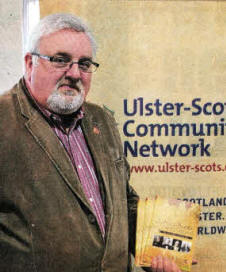Tales of the New England settlers told in new book
 THE
story of Ulster-Scots emigrants to the New World' 300 years ago is well
known, but the tale of the first settlers in New England has been strangely
neglected.
THE
story of Ulster-Scots emigrants to the New World' 300 years ago is well
known, but the tale of the first settlers in New England has been strangely
neglected.
That has now been put right in a new booklet by well known Lisburn historian Mister McReynolds.
In The Ulster-Scots & New England: Scotch-Irish foundations in the New World', Mister recalls how in the first decades of the 18th century the emigrants settled in New England.
However, they did not get on with the Puritans who controlled government and whom they came to regard as worse than the ecclesiastical authorities they had left behind in Ulster. When the Ulster-Scots settlers in Worcester, Massachusetts, tried to build a Presbyterian Church, their Puritan neighbours tore it down.
So future Ulster Scots emigrant ships headed further south. They then fanned out west, along the three great river valleys and mountain ridges: first, up the Delaware Valley into south-eastern Pennsylvania; across the Potomac into the Shenandoah Valley and beyond the Piedmont ridge into the Carolinas and eventually into Tennessee.
Nevertheless, between 1717 and 1720 54 emigrant ships sailed from Ulster, many of them from Londonderry, to the ports of New England.
In 1718 five ships, full of Ulster-Scots Presbyterians led by their minister, the redoubtable Rev James McGregor, arrived in Boston. Many of these were either veterans of the Siege of Derry or descendants of the men who had defended Derry's walls during the 'Great Siege'.
These stern and unbending men and women were not going to be easily intimidated. They decided to 'stay put' and put down roots in New England.
The story of how these people came to have such a huge influence on their
new homeland is
told in Mister's work, which is published by the Ulster-Scots Community
Network.
He chronicles and details the some of the communities these formidable Ulster-Scots established in New England. Even more interesting are the fascinating pen portraits he provides of some of the settlers and their high-achieving descendants. Rev James McGregor, a fiery preacher who took his gun well loaded and primed' into the pulpit every Sunday and an ancestor of John Kerry, the US Democratic Presidential candidate in 2004; Rev Matthew Clark, originally from Kilrea and another veteran of the Siege of Derry; and General John Stark, whose motto was 'live free or die' which was adopted by New Hampshire as the state motto in 1945, fall into the first category.
Among those falling into the second category are General Henry Knox, a military genius, a close associate of George Washington and a hero of the Revolutionary War; Robert Dinsmoor, New Hampshire's answer to Robert Burns; Asa Gray; the Darwinian botanist and devout Presbyterian; and Horace Greeley, the newspaper editor who was regarded as 'the conscience of America'.
Happily, Alister reports that there is growing interest, especially in New Hampshire and Maine, in New England's Ulster-Scots heritage. This is evidenced, for example, by the formation of the Maine Ulster-Scots Project which seeks to collect and archive the history of Maine's Ulster-Scots families.
'The Ulster-Scots & New England: Scotch-Irish foundations ín the New World' is available free by writing to the Ulster-Scots Community Network at 68-72 Great Victoria Street, Belfast BT2 7BB or by telephoning 9043 6710 or by e-mailing info@ulster-scots.com
Ulster Star
06/05/2011

